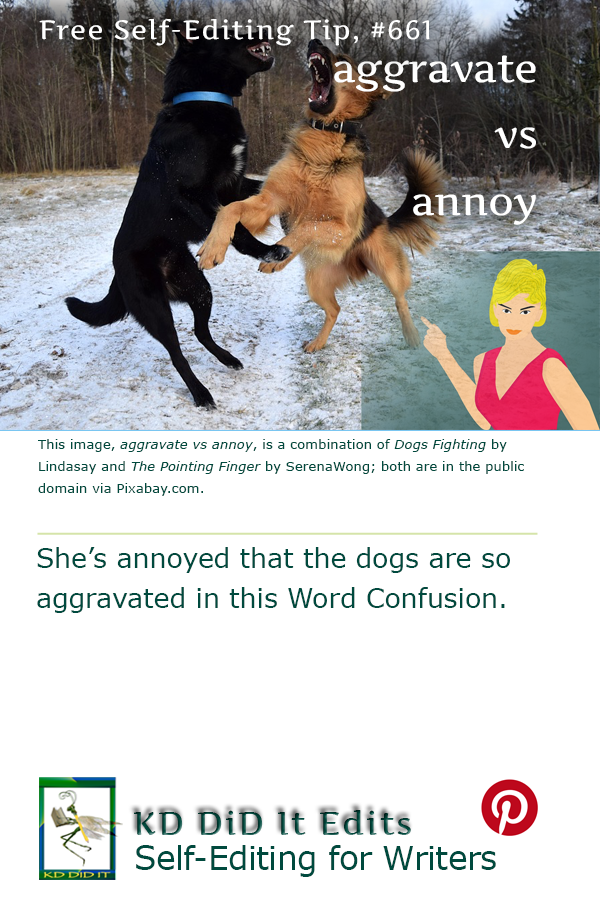Revised as of
17 June 2023
Annoy is bothersome, a small irritation. When it grows into a real pain in the tush, it aggravates. Kind of like the battle I’ve been having with Apple over the problems I’ve been having with my iMac.
It was quite annoying when I had to have the hard drive replaced (the first time) less than 30 days after I bought it. Three-and-a-half years later, and waaay too many calls to Apple support and the hours spent dealing with the various issues, I’ve gone beyond aggravated.
Word Confusions . . .
. . . started as my way of dealing with a professional frustration with properly spelled words that were out of context in manuscripts I was editing as well as books I was reviewing. It evolved into a sharing of information with y’all. I’m hoping you’ll share with us words that have been a bête noire for you from either end.
If you found this post on “Aggravate versus Annoy” interesting, consider subscribing to KD Did It, if you’d like to track this post for future updates.
| Aggravate | Annoy |
|---|---|

And You Thought You Had Computer Problems by Amanda Lohr is under the CC BY-ND 2.0 license, via Flickr. — I got so aggravated . . . |

Rainy Day on the Beach is in the public domain, via PxHere. — Dang, that’s annoying . . . |
| Part of Grammar: | |
| Verb, transitive
Third person present verb: aggravates |
Noun; Verb, intransitive & transitive Plural for the noun: annoys Third person present verb: annoys |
Make a problem, injury, or offense worse or more serious
[Informal] Annoy, irritate, or exasperate someone, especially persistently To cause to become irritated or inflamed |
Noun: [Archaic] An annoyance [Rare; literary] A feeling of discomfort or vexation caused by what one dislikes [Rare; literary] That which causes such a feeling Verb, intransitive: To cause annoyance Irritate (someone)
Verb, transitive:
To molest [Archaic] Harass with repeated attacks
|
| Examples: | |
| Military action would only aggravate the situation.
She found him thoroughly aggravating and unprofessional. The gesture aggravated me even more. His questions aggravated her. Her pushing at this only aggravates his grievance. The child’s constant scratching aggravated the rash. |
Noun: As a noun, annoy has been replaced with annoyance I can understand your annoyance; I’d be furious if Apple treated me this way. Much to our annoyance, we were too far from the fairway. One of summer’s greatest annoyances is being bitten by mosquitoes every night. She couldn’t suppress her annoyance when the food was returned to the kitchen uneaten. My aunt snorted in annoyance and marched off to find the manager. Then, to our great annoyance, traffic was backed up for 20 minutes. Verb, intransitive: Verb, transitive: When I was a child, my younger siblings used to annoy the heck out of me. Well, President Trump certainly does annoy people. They annoyed the neighbors with their constant fighting. He was a gallant Saxon, who annoyed this Coast. |
| Derivatives: | |
| Adjective: aggravated, aggravating, aggravative Adverb: aggravatingly Noun: aggravating, aggravation, aggravator Verb, transitive: overaggravate, overaggravated, overaggravating, preaggravate, preaggravated, preaggravating, reaggravate, reaggravated, reaggravating |
Adjective: annoyed, annoying, half-annoyed, half-annoying, unannoyed, unannoying Adverb: annoyedly, annoyingly, half-annoyingly Noun: annoyance, annoyer, annoyingness |
| History of the Word: | |
| Mid-16th century, from the Latin aggravat- meaning made heavy, from the verb aggravare, which is from ad- (expressing increase) + gravis heavy.
Aggravate in the sense annoy or exasperate dates back to the 17th century and has been so used by respected writers ever since. |
Middle English, in the sense of be hateful to, from the Old French anoier (verb), anoi (noun), based on the Latin in odio as in the phrase mihi in odio est meaning it is hateful to me. |
C’mon, get it out of your system, bitch, whine, moan . . . which words are your pet peeves? Also, please note that I try to be as accurate as I can, but mistakes happen or I miss something. Email me if you find errors, so I can fix them . . . and we’ll all benefit!
Satisfy your curiosity about other Word Confusions on its homepage or more generally explore the index of self-editing posts. You may also want to explore Book Layout & Formatting Ideas, Formatting Tips, Grammar Explanations, Linguistics, Publishing Tips, the Properly Punctuated, Writing Ideas and Resources, and Working Your Website.
Resources for Aggravate versus Annoy
Apple Dictionary.com
Cambridge Dictionary: annoyance
Dictionary.com: aggravate
Pinterest Photo Credits:
Dogs Fighting by Lindasay and The Pointing Finger by SerenaWong are both in the public domain via Pixabay.com.


